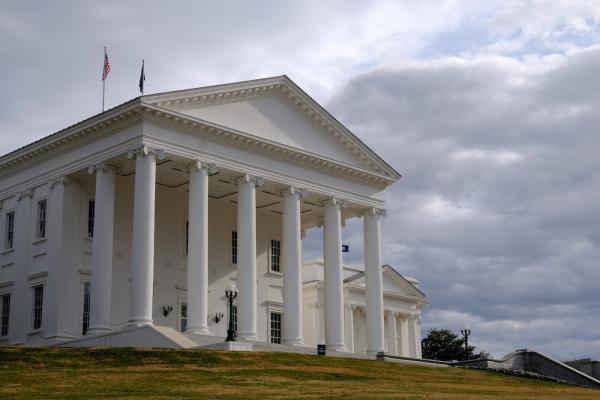Lawmakers in Virginia voted on Friday to abolish the death penalty. The Democratic-led House of Delegates voted 57-41 Friday, after the Senate passed the measure earlier this week. Gov. Ralph Northam, a Democrat, said he would sign the repeal into law.
“This is an incredibly significant step toward prioritizing the creation of a more equitable and restorative criminal legal system,” said Krisanne Vaillancourt Murphy, executive director of Catholic Mobilizing Network, in an email to Sojourners.
While 23 other states have abolished capital punishment — most recently Washington, New Hampshire, and Colorado in 2018, 2019, and 2020, respectively — Virginia would be the first Southern state to end the practice.
“It’s important that Virginia is the first formerly confederate state to [vote to] abolish the death penalty,” Shane Claiborne, death penalty abolition activist and author of Executing Grace, told Sojourners. “The death penalty, as Bryan Stevenson says, is the descendant of lynching. You see the evolution of our violent history around race still manifest itself in the death penalty, meaning where lynchings were happening 100 years ago is where executions are still happening.”
Griffin Hardy, communications manager for death penalty abolition activist Sister Helen Prejean, says the decision is in sync with public sentiment. According to Gallup, 60 percent of Americans say that life imprisonment with no possibility of parole is a better punishment for murder than the death penalty.
“This tells us, regardless of the politics of the past, that death penalty abolition is not a partisan issue anymore,” Hardy told Sojourners. “This vote in Virginia was bipartisan. There was support from a broad range of people, including murder victim family members who support abolition.”
Providing closure for the family members of murder victims is often cited as a reason for continuing the death penalty. Yet, this results in families being used as political pawns, Hardy said, noting that “when a victim’s family doesn’t support an execution, they’re just ignored. Their wishes aren’t respected.”
Such was the case for SueZann Bosler whose father was murdered by James Campbell in 1986. Bosler watched as Campbell stabbed her father 22 times; Bosler was then stabbed five times herself and left for dead.
Instead of fighting to see Campbell killed, Bosler made it her mission to save Campbell’s life. After two death sentences, Campbell is currently serving life in prison.
“When they execute people, they are bringing more victims into the system,” Bosler told Sojourners. “... I told the prosecutor time and time again that I did not want the death penalty for Campbell. They were saying, ‘SueZann, I understand you’re against it. But we’re doing it for everyone in Florida to be safe.’”
“It made no sense,” said Bosler, who co-founded Journey of Hope from Violence to Healing, an anti-death penalty organization led by family members of murder victims.
Activists like Bosler hope that Virginia, which held its first execution in 1608 and has since conducted more executions than any other state, will pave the way for other states and for the federal government to also abolish the death penalty.
On a federal level, the future is murky. Former President Donald Trump resumed the execution of prisoners on federal death row last summer after a 17-year hiatus and killed 13 people in the last seven months of his presidency. That followed six decades which saw a total of three federal executions. Last year was the first time the U.S. government executed more people than all 50 state governments combined.
President Joe Biden, however, campaigned on abolishing the federal death penalty. Lawmakers in Congress are asking him to support bills that would repeal capital punishment.
As for Virginia, two men remain on Virginia's death row, including Thomas Porter, who was convicted of killing a police officer in 2005. The state last carried out an execution in 2017.
Activists see Friday’s decision as a signal of hope.
“If Virginia can abolish the death penalty given its place in history, I think any state and the federal government can do it, too,” Hardy said.
They also say it will spur more activism.
“We’re going to be celebrating this all day,” Bosler said. “Then we’re going to go on and fight for the other 27 states that we need to abolish the death penalty.”
Reuters reporting contributed to this story.
Got something to say about what you're reading? We value your feedback!





